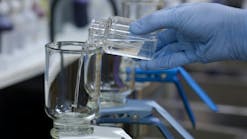Jan. 5, 2011 -- Scientists in China are reporting development of a less expensive, more eco-friendly method for making deuterium-depleted drinking water, citing studies suggesting that it may be a more healthful form of water. Their report appears in ACS' bi-weekly journal Industrial & Engineering Chemistry Research.
Changgong Meng and Feng Huang note that natural water, widely known as H2O, actually is a mixture of H2O and tiny amounts of D2O -- about 150 parts per million (ppm), or a few drops of D2O in every quart of water. Deuterium-depleted water usually contains about 125 ppm. The "D" is deuterium, an isotope or variant form of hydrogen often termed "heavy hydrogen." They cite accumulating evidence that water with high levels of deuterium may have adverse health effects on animals and plants, while deuterium-depleted water may be useful in treatment of certain diseases. Existing ways of removing deuterium from water tend to be expensive, inefficient, or environmentally harmful.
They describe a new method that helps overcome these problems, and could be the basis for the first industrial-scale production of deuterium-depleted water. It involves a platinum catalyst that quickly and efficiently removes deuterium from water using a combination of cold and hot temperatures. In laboratory-scale tests, the new technique reduced the amount of deuterium in water from about 145 parts per million to 125 parts per million. The resulting water is suitable for drinking, the scientists say, and could be produced in large quantities at economical cost.
Download Full Text Article > http://pubs.acs.org/stoken/presspac/presspac/full/10.1021/ie101820f
###


